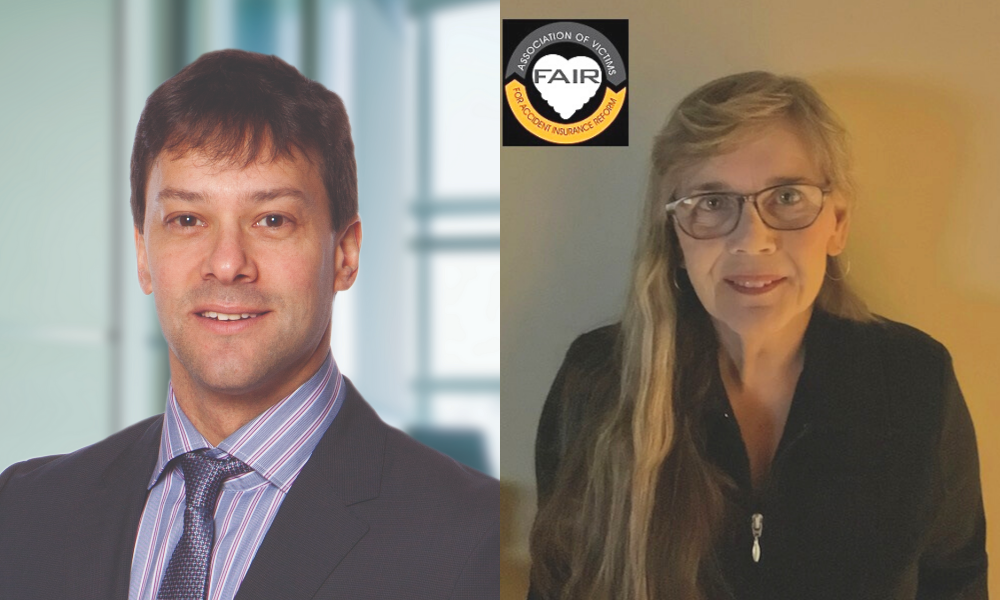
A Medical expert's role is to assist the court, not the side who pays them: Justice Lemon

In a recent decision which underscores medical professionals’ obligation to testify objectively in court, a Superior Court judge awarded more than $2.4 million in damages after rejecting the defense expert’s opinion that the plaintiff did not suffer a traumatic brain injury.
In Graul v. Kansal, Justice Gordon Lemon reviewed the testimony from defense experts Dr. Lawrence Freedman and Dr. Sarah Mitchell and criticized their testimony’s scope and objectivity.
“Trial judges will always need expert evidence in some areas. Those exceptional individuals who assist the courts need to be paid. But they also need to understand their role is to assist the court, not the party who pays them,” Justice Lemon wrote.
Darcy Merkur, a personal injury lawyer and partner at Thomson Rogers, says the court decision is refreshing and causes medical experts to rethink their actions to avoid ruining their careers. “Those experts are saddled with the court’s perception of them and will have an impossible time showing their face in another courtroom and expecting to be given credibility. Their reputation is in major Jeopardy, and their career as an expert is gone.”
Merkur says written decisions with a judge’s view of medical expert testimonies are rare because most personal injury trials are car accident lawsuits in which six jurors decide the outcome instead of a judge.
Jurors do not give written reasons about witnesses’ evidence, so he says lawyers are often unsure about a medical expert’s objectivity from the jury. For example, Dr. Freedman may have testified in front of a jury several times, but no one knows if a jury found him credible.
He says that the court must continue to take an aggressive stance on permitting expert testimony and should only allow it when they believe that the expert’s opinions are well reasoned and objective.
“The court must be assertive in stopping testimony from experts with either unknown reputations that are not credible or failed to put enough time into their views in the first place,” Merkur says. “It just muddies the case unnecessarily, and it’s a real big problem in front of a jury who doesn’t understand the dynamics of paid expert opinions.”
The dispute began after defendant Dev Raj Kansal drove into the plaintiff Jonathan Graul’s car in 2017. Graul, supported by his doctors and experts in the litigation, alleged that he suffered a mild traumatic brain injury, including memory and focus issues relating to his hearing and vision and back and neck pain. In addition, the accident affected his ability to return to work and significantly curtailed his recreational pursuits and social life.
Before the accident, Graul was a supervisor with the City of Guelph, working at the Guelph wastewater treatment plant earning $100,000 per year, was active in sports and recreational activities and was an engaged father and husband with excellent health.
The defendants argued that Graul’s difficulties were exaggerated and, to the extent that he has any injuries, his treatment choice made them worse. They suggested that with the correct treatment and some accommodation, Graul could return to work.
The defendants’ hired the medical assessment company AssessMed and retained Freedman and Mitchell as medical experts in neurology and neuropsychology to review Graul’s condition.
Freedman testified that Graul did not sustain a traumatic brain injury. However, Justice Lemon questioned Freedman’s credibility and rejected his testimony. He noted that Mitchell’s testimony assisted the plaintiff but chastised the ignorance of her pivotal role in the trial after she laughed when caught in a statement contradiction.
“I do not expect an expert to laugh when caught in a significant contradiction in her evidence as Dr. Mitchell did, he wrote. That demonstrates a lack of awareness of the significance of the expert witness’s role.”
“I encourage Dr. Freedman and Dr. Mitchell to focus their exceptional medical knowledge and experience on the patients that need them and to forgo this well-paid role. If they intend to carry on this line of work, I recommend that they familiarize themselves with the principles of expert evidence set out in R. v. France, 2017 ONSC 2040, 36 C.R. (7th) 293. Where their evidence conflicts with other expert evidence, I reject their evidence.”
Justice Lemon accepted that Graul would have worked until he was 70 years old and awarded $225,000 in general damages, income losses of $1.3 million and care costs of $735,000.
He also noted that an AssessMed administrative assistant adjusted Graul’s medical report, and Rhona DesRoches, the FAIR Association of Victims for Accident Insurance Reform chair, says there is no information on who changed the report.
The legal profession must question who watches Ontario’s medical assessment centres because a person’s quality of life will depend on these medical reports, DesRoches says.
“When a judge suggests that an insurer assessor familiarize themselves with the principles of expert evidence, it’s something to be concerned about.”
She says failure to regulate medical assessment centres is becoming a growing problem as insurers make unqualified healthcare decisions and administrators manage report adjustments without a medical degree.
“They have a lot of information that sits in front of them. They’re not grounded in any parameters on what they do with the files because they have no college oversight. So, in this decision, the judge hits on many of these issues.”
Furthermore, supermarkets like Loblaws are entering the health care system with the recent acquisition of Shoppers Drug Mart and Lifemark Health Group, the parent company of AssessMed. DesRoches says the new development is concerning because companies will have more discretion in whether a patient receives treatment.